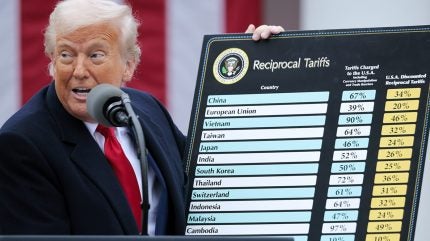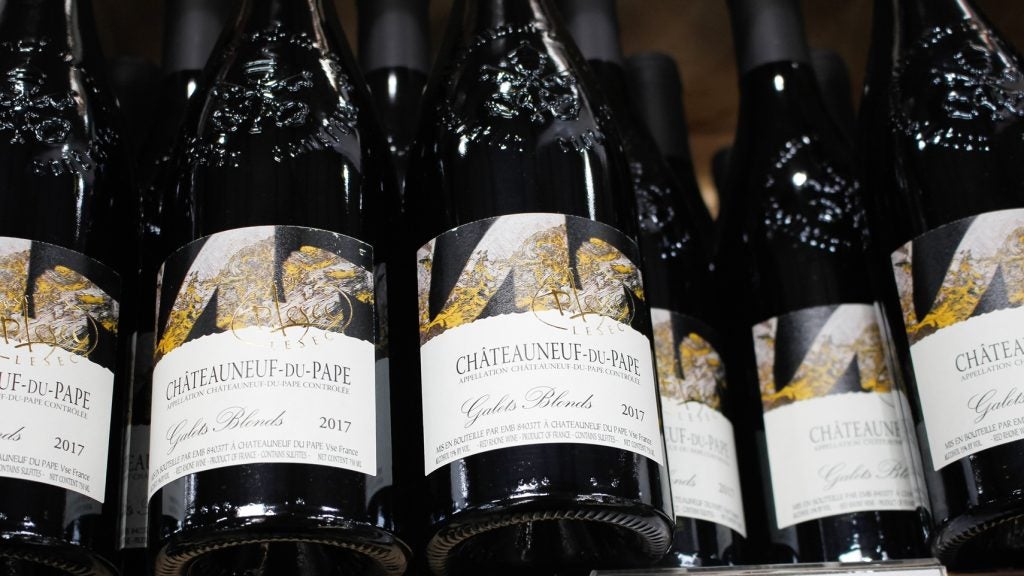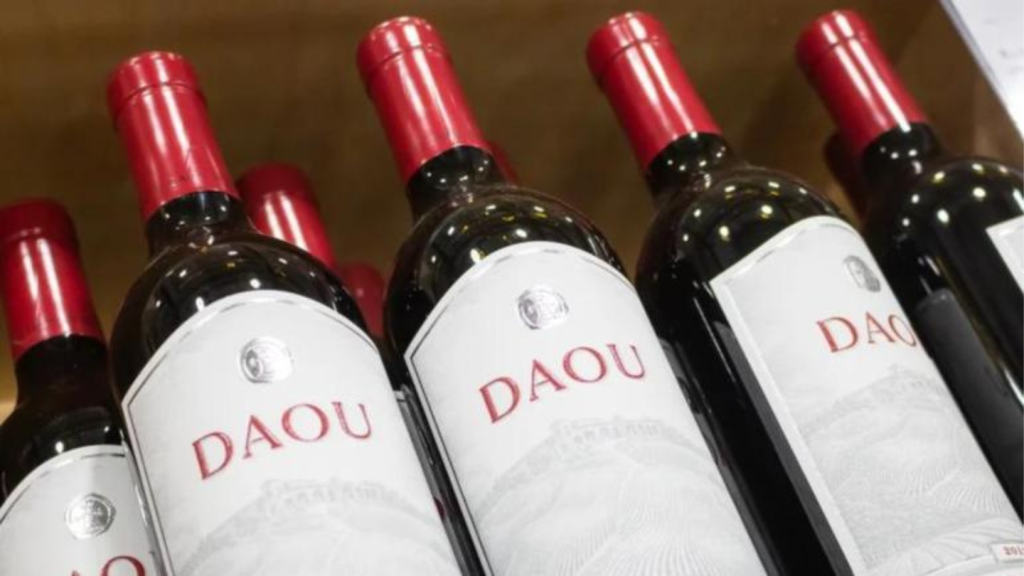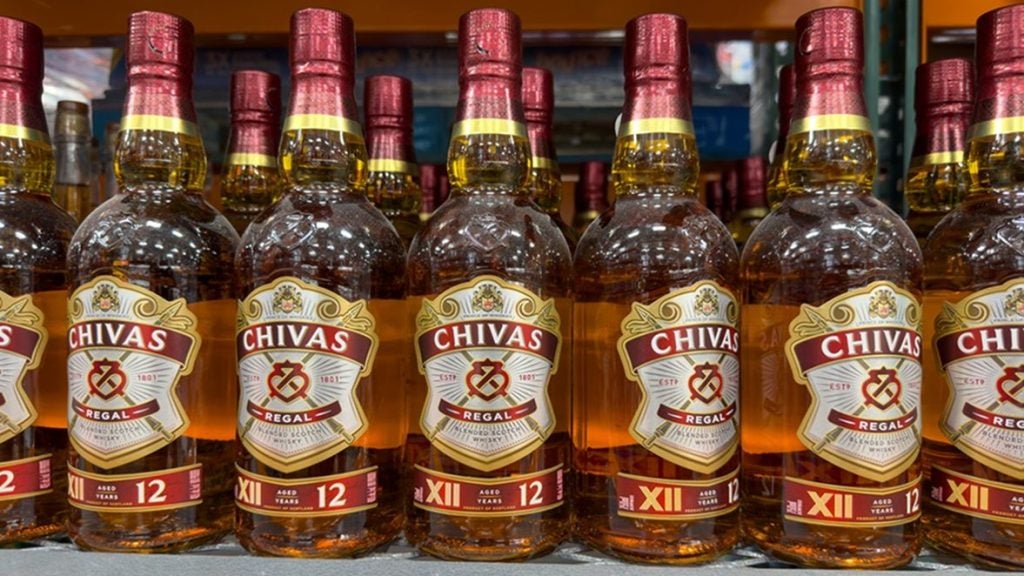
President Trump has set out a range of new tariffs on imports into the US, arguing the moves will strengthen the country’s economy.
“My fellow Americans, this is Liberation Day,” Trump said in the Rose Garden of the White House yesterday (2 April) as he unveiled a universal “baseline” tariff of 10% on all imports into the US. The levy will come into effect on Saturday.

Discover B2B Marketing That Performs
Combine business intelligence and editorial excellence to reach engaged professionals across 36 leading media platforms.
Some nations and trading blocs face higher rates; EU imports are to be hit with a 20% tariff, products from Japan have been lined up with a tariff of 24% and shipments from China are to be slapped with aggregate levies of 54% (though that includes earlier tariffs). South Africa is bracing for a 30% levy. These are set to go live on Wednesday.
The 10% baseline tariff does not apply to imports from Canada and Mexico but the countries have already been targeted with separate measures.
As business leaders digest the announcement, here is a snapshot of the breaking reaction from within the drinks industry.
“Targeting EU wine will only make losers on both sides of the Atlantic” – EU wine lobby body CEEV
“The announced reciprocal tariffs on EU wines will damage EU wine companies and would create economic uncertainty and result in layoffs, deferred investments and price increases,” CEEV secretary general Ignacio Sánchez Recarte said.

US Tariffs are shifting - will you react or anticipate?
Don’t let policy changes catch you off guard. Stay proactive with real-time data and expert analysis.
By GlobalData“The US wine market is fundamental for the economic sustainability of the EU wine sector. The imposition of reciprocal duties on Transatlantic wine trade appears unjustified considering the minimal difference in duties between the EU and US tariffs on wine products.”
Responding to the news on LinkedIn, Sánchez Recarte said: “Targeting EU wine will only make losers on both sides of the Atlantic. The US wine market is fundamental for the economic sustainability of the EU wine sector.”
“This isn’t just about trade. It’s about people, livelihoods and an agricultural success story built over generations” – Californian wine advocacy group Wine Institute
Reacting to the announcement, Robert Koch, the president and CEO of Wine Institute, also reflected on the ongoing dispute with Canada, which has hit US wine, spirits and beer sales for weeks.
“Today’s announcement of new tariffs will only make it harder for American wineries to regain access to Canada, by far our most important export market. In early March, Canada cleared its shelves of all US wine and continues to block its sale. As this dispute drags on, it is creating economic instability at a time when the industry is already under significant pressure,” Koch said.
“This isn’t just about trade. It’s about people, livelihoods and an agricultural success story built over generations. When our industry is disrupted, the impact reaches far beyond the winery – affecting farmworkers, distributors, small businesses, restaurants and entire communities across the country.”
France wine trade association FEVS calls “for a fair and reciprocal transatlantic trade in wines and spirits”
France’s wine and spirits trade association Fédération des Exportateurs de Vins & Spiritueux de France (FEVS) called “for a fair and reciprocal transatlantic trade in wines and spirits” in response to President Trump’s blanket tariffs announcement yesterday.
The group warned the French wine sector could expect to see a €800m dip in exports value dropping to €1.6m to for the full 27 EU member states.
“This tariff clash only creates losers, both in Europe and in the United States. Moreover, our American counterparts, with whom we have worked for decades, are also conveying this message to the American authorities,” said Gabriel Picard, the president of the FEVS.
“For thirty years, spirits have opted for the complete elimination of tariffs between the United States and the European Union, to the benefit of producers on both sides of the Atlantic,” Picard added.
“We can do the same for wines: we have proposed a Reciprocal and Fair Trade Agreement on Wines and Spirits to the European Commission. We hope that the Commission will immediately include it in its positive agenda for discussions with the United States, so that, along with spirits, wines can contribute to building a positive trade relationship between the United States and the European Union.”

Europe’s brewers point to Trump’s move on aluminium
Away from Trump’s announcement of the sweeping “reciprocal” tariffs, there was a notable change to the levies the US is placing on aluminium.
The US is placing a 25% tariff on all beer imports after adding beer and empty aluminium cans to a list of products that are subject to the country’s levies on aluminium.
“Whilst there is an 20% tariff on all EU products, it is the addition of Beer to the Annex 1 list of aluminium derivative products facing a 25% tariff that is particularly concerning to Europe’s ten thousand breweries,” Julie Leferman, secretary general of trade association Brewers of Europe, said.
“The US is European brewers’ second most important export market for beer in both value and volume terms. We are currently seeking further clarity on the exact products captured by this new announcement.”
“Brewing is a key driver of growth, investment and employment on both sides of the Atlantic and a major part of people’s lives on both continents. With value chains that stretch from the farmers grafting in the fields to the hardworking staff in the bars, it is critical to de-escalate and work towards a solution that cuts tariffs on beer and thus benefits consumers, workers and businesses in both the EU and the US.”
South Africa winemakers call for free-trade deal
Trade association Wines of South Africa told Just Drinks there are “still too many unknown factors and also points that will only be clarified in the long run” but said it had earlier told its members the planned 30% tariff “poses a significant challenge to our industry”.
The US, the third-largest market for South African wine, accounts for 6% of exports, Wines of South Africa said. In 2024, the country shipped R659m ($35.1m) of wine to the US, down 7% year on year (the dollar value of sales declined 5%).
“This tariff threatens our exporters and increases costs for US consumers who have embraced South African wines for their quality and value,” Wines of South Africa told its members.
“South Africa lacks a free-trade agreement with the US, unlike other key competitors such as Chile, Australia, and Brazil, which face only 10% tariffs. Kenya, which is negotiating a free-trade agreement, has been levied significantly lower tariffs. Given this, a long-term South Africa-US trade agreement should be prioritised to ensure global market stability and competitiveness.”
Tariffs to have “minimal impact”, Treasury Wine Estates says
Australia-based Treasury Wine Estates, home to the Penfolds brand, issued a stock-exchange filing in the wake of Trump’s announcement.
Treasury, which also owns California’s Daou Vineyards, said it does not expect the measures to have “a material impact on its business”.
The group said its operations in the Americas are “well placed given the composition of its portfolio”.
In the first half of Treasury’s 2025 financial year, around 85% of Treasury Americas’ “brand contribution” was from US-produced wines such as Daou, Frank Family Vineyards and Beringer.

“We urge President Trump to liberate the US spirits sector from these tariff disputes” – US spirits trade body DISCUS
Chris Swonger, the CEO the Distilled Spirits Council of the United States (DISCUS), said the trade body was calling on the US government to find a resolution and a return to “zero-for-zero tariffs”.
“We urge President Trump to liberate the US spirits sector from these tariff disputes by negotiating deals that get us back to fair and reciprocal zero-for-zero tariffs for spirits products.”
Swonger stressed that many spirits sold into the US like Bourbon, Tennessee Whiskey, Irish whiskey, Cognac and Scotch “cannot simply be moved to another country or region”.
“A return to zero-for-zero tariffs with our key trading partners will enable the 3,100 distillers across the United States to partake in the limitless growth opportunities that exporting has to offer,” he added.
“We recognise that President Trump is working to secure fair and reciprocal trade and stand ready to work with the administration to untangle the spirits industry from the recent trade disputes so we can resume zero-for-zero trade with our major trading partners.”
The Scotch Whisky Association wants “measured and pragmatic approach towards a mutually beneficial resolution“
The UK’s Scotch Whisky Association said the sector was “disappointed that Scotch Whisky could be impacted by these tariffs”.
It added: “We welcome the intensive efforts by the UK government to reach a deal with the US administration and we continue to support this measured and pragmatic approach towards a mutually beneficial resolution.”
The US is the largest export market for Scotch whisky. According to SWA figures, Scotch distillers shipped £971m of whisky to the US in 2024, a figure that was down 0.7% on a year earlier.
In volume terms, the US ranks third on the list of Scotch’s largest markets by case sales. Last year, export volumes stood at 132m bottles, a rise of 3.7% year on year.

“It is essential that both sides prioritise constructive dialogue“ – FoodDrinkEurope
Industry body FoodDrinkEurope stressed two-way trade between the EU bloc and the US in agri-food raw materials, ingredients, and finished products amounted to €40bn ($44.2bn).
“The EU food and drink industry is a major driver of growth, employment, and innovation, with significant investments from EU and US companies in both regions,” the trade association said.
“We reiterate our call for the de-escalation of trade tensions and welcome the EU’s desire to reach a negotiated outcome. It is essential that both sides prioritise constructive dialogue to find solutions that safeguard the integrity of our long-standing and mutually beneficial transatlantic trade relationship.”
EU preparing counter-measures, von der Leyen says
The European Commission president, Ursula von der Leyen, issued a strongly worded statement, saying she was “ready to support any efforts to make the global trading system fit for the realities of the global economy, but, at the same time said: “I also want to be clear: reaching for tariffs as your first and last tool will not fix it.”
She added in a statement rolling off specific concerns: “The global economy will massively suffer; uncertainty will spiral and trigger the rise of further protectionism; the consequences will be dire for millions of people around the globe.”
And the EU president suggested reactionary measures are in the pipeline.
“We are already finalising a first package of countermeasures in response to tariffs on steel. And we are now preparing for further countermeasures, to protect our interests and our businesses if negotiations fail,” von der Leyen said.
“We will also be watching closely what indirect effects these tariffs could have, because we cannot absorb global overcapacity nor will we accept dumping on our market.”





